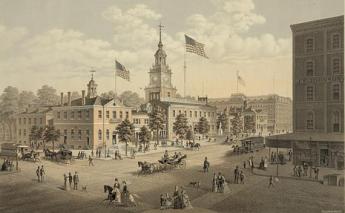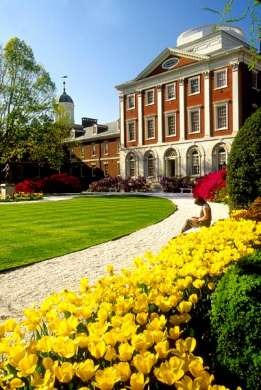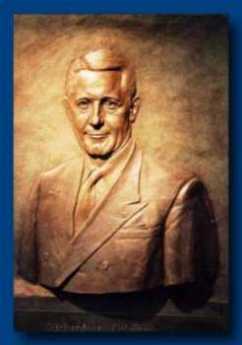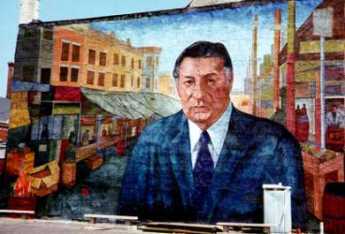Related Topics
Downtown
A discussion about downtown area in Philadelphia and connections from today with its historical past.

Philadelphia Politics
Originally, politics had to do with the Proprietors, then the immigrants, then the King of England, then the establishment of the nation. Philadelphia first perfected the big-city political machine, which centers on bulk payments from utilities to the boss politician rather than small graft payments to individual office holders. More efficient that way.
Tourist Walk in Olde Philadelphia
Colonial Philadelphia can be seen in a hard day's walk, if you stick to the center of town.
Favorite Reflections
 In no particular order, here are the author's own favorites.
In no particular order, here are the author's own favorites.
Sixth and Walnut over to Broad and Sansom
 In 1751, the Pennsylvania Hospital at 8th and Spruce was 'way out in the country. Now it is in the center of a city, but the area still remains dominated by medical institutions.
In 1751, the Pennsylvania Hospital at 8th and Spruce was 'way out in the country. Now it is in the center of a city, but the area still remains dominated by medical institutions.
Mayors and Limos

|
| Mayor Richardson Dilworth |
A number of prominent figures participated in the downtown revival of Philadelphia after the Second World War, with a surprising amount of jealousy among them. Mayor Richardson Dilworth would have to be mentioned in any list of those leaders, but one who was more admired than loved. Aristocratic and flamboyant, he disdained the little hypocritical dissembling so characteristic of politicians. In fact, he didn't see himself as a politician at all, he was a leader.
Once Dilworth became convinced that Society Hill revival was not only desirable but feasible, he moved there. He purchased two houses next to the Athenaeum on Sixth Street, and in spite of the protest of preservationists that those two houses were particularly fine examples of Federalist style on Washington Square, he had them torn down. Furthermore, in spite of outcries that the house he was building in their place was merely a pseudo-colonial gesture, he constructed a very expensive but extremely comfortable modern house. Those of us who were familiar with the neighborhood were impressed with the courage he displayed in doing this, because the area was just a little dangerous, and almost no one else lived there. You could buy dozens of twenty-room houses in the neighborhood for less than $2000 apiece, and it seemed foolhardy to make such a large personal investment in what might become a stranded gesture. This was described as flaunting his personal wealth because it was not just a fine house, it was possibly going to be a big loss.
Dillworth got away with it. He was seen as courageous, and a leader. Others started moving into the area, mostly rehabilitating old mansions. By the time the house was eventually sold by his estate, his conspicuous consumption turned out to be a profitable investment. Smart.
Dilworth had some practical problems. It wouldn't have been smart politics to have a long black limousine pick him up in the poor neighborhood. The only people who do that are undertakers and the Mafia. On the other hand, the driver of a limousine often doubles as a bodyguard, and a bodyguard wouldn't be a bad idea. Those of us who drove down 6th Street every morning at 8:30 gradually noticed what Dilworth did to solve the problem.

|
| Frank Rizzo |
Every morning a Yellow Cab could be seen parked outside his door. It always had the same uniformed driver, and on closer inspection, the cab was the cleanest shiny late-model car, painted yellow. It was only six or seven steps from the door of the house to the door of the car, and he was off and gone in a moment.
Other mayors have had quite different styles.Frank Rizzo had his long black car and several like it parked on the sidewalk outside City Hall. His image was that of a poor boy from the neighborhoods who had made it to the top. No matter where he went, Rizzo was leading a parade.

|
| Ed Rendell |
Ed Rendell, on the other hand, was playing the role of America's Mayor. His driver would blow the horn, put on the headlights during the day, roar through town, making screeching u-turns right and left. Several times a day he would put on this act, going two blocks from City Hall Annex to the Convention Center, to address an audience of visitors.
Well, mayors and bank presidents are supposed to have limousine service. Anyone else would have to ask whether it was worth all the trouble if instead, you could just catch a cab. Those long cars are surprisingly uncomfortable to ride because the roof is so low you have to crawl on hands and knees to get in a seat. Finding a place to park one of those monsters, or even a wide enough opening next to the curb to let out the back-seat occupant, can be a problem in the center of a city. Even with portable cellular phones, there is a delay after you call for the car when you are ready to leave your appointment. Those who have tried it find that hiring a driver almost always confronts you with a demand to circumvent taxes by paying the driver in unrecorded cash. In South America, where bodyguards are really necessary, the great majority of them flee in terror at the first sign of the underworld. Limos are a pain.
At least in Philadelphia, you can get a fairly clean, fairly new cab with a fairly knowledgeable driver, by simply holding up your hand at any center city street corner. During business hours at least, you can hail a cab in three minutes. That doesn't just happen that way, and the mayor has something to do with it. Cities usually have a Medallion system of cab licensing, and existing cab companies don't want any medallions issued to competitors. In politics, such a situation helps campaign funds considerably. The result is a shortage of cabs, surly drivers, and high prices. Boston is such a town. On the other hand, if medallions are easy to obtain, as they are in Washington DC, the cabs become numerous enough but are shabby dilapidated old vehicles, driven by recent immigrants who don't know the street names. In Philadelphia, we take our good fortune for granted, but we do owe a debt to the city government for managing the supply and demand situation to the point where it mostly would be foolish to have your own car and driver. In this town, every man a king.
As a matter of fact, in Boston it got so bad that Ned Johnson, the richest man in town (he personally owns the Fidelity Mutual Fund Investment Family) got so enraged that he couldn't ever get a cab that he founded his own cab company. It's a very elegant one, although a little expensive. The Boston Coach Company supplies immaculate and impeccable service for a fee. At first, it was only available to Fidelity executives but now has spread out to anyone willing to pay for it, and flourishes in many cities, plus chartered airplanes if you don't like to wait in security lines at airports. You have to admire Johnson for his golden business touch, but in Philadelphia, we can just use cabs.
Originally published: Monday, June 26, 2006; most-recently modified: Friday, August 09, 2019
| Posted by: Joe | Aug 20, 2009 11:56 AM |
Dilworth was not fat he was trim. He did not wear a vest. And was known for his double breasted suits.